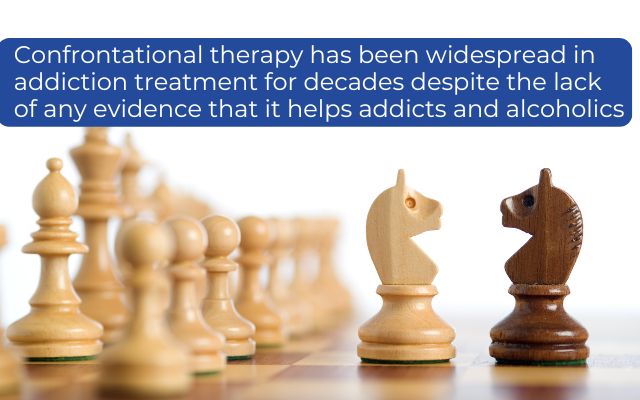
Confrontational Addiction Treatment Harms Recovery Outcomes
Could confrontational or aggressive treatment methods be undermining recovery and causing more harm than they prevent?
Confrontational treatment approaches have been used for addiction treatment for decades, despite the fact there is no evidence to show it is effective. Studies show that confrontational treatment actually does more harm than good.
This is blog number 13 in the series 20 things you should know about rehabilitative treatment: What works. This list was compiled by the European Association for the Treatment of Addiction, according to the latest evidence.

What is confrontational therapy?
Therapeutic confrontation is defined “as the process by which a therapist provides direct, reality-oriented feedback to a client regarding the client’s own thoughts, feelings or behavior”. This confrontational approach for counselling addicts and alcoholics includes “frank feedback … profanity-laden indictments, screamed denunciations of character, challenges and ultimatums, intense argumentation, ridicule, and purposeful humiliation”.
Confrontational therapy has been widespread in addiction treatment for decades despite the lack of any evidence that it helps addicts and alcoholics or has any positive impact on those in rehab. There was a belief, still found in some rehabs, that aggressive and confrontational counselling was necessary to break the client’s defences and denial.
Fifty years of research has failed to produce even one study that shows that confrontational methods are effective. In fact, some studies show that this therapy approach is harmful.
Confrontational approaches were originally used in peer-based groups but soon professionals in treatment centres adopted these approaches which greatly increased the “potential for abuse”.
I was done with life and reached out to rehab centers. Within 5 minutes, Changes called back, confirmed my medical aid authorisation, and after a week of being admitted I finally felt hope.
A phenomenal loving environment. Was well taken care off in my biological, psychological, social and spiritual healing. Got me to give the 12 steps a real shot and that changed everything.
I came to Changes a complete wreck. Didn’t want to do anything about my drug addiction. I fought the system for as long as I could but eventually my mind was changed about what I had to do.
I'm proud of the family we are at Changes and the work we do because it comes from our heart and care. Due to that care, we change lives. Changes Treatment Centre is where we make change without fear.
Thank you to everyone at Changes who helped my daughter through this difficult time. They not only helped her but kept in constant contact with me, updating me on her progress and checking up on how I was doing.
Why doesn’t it work?
These confrontational approaches are underpinned by the belief that addiction is not an illness but a sign of a moral failing or flawed character. This approach implies an addict or alcoholic is bad and not sick, despite the fact that addiction is accepted as a diagnosable mental disorder by science and the medical community.
These counselling sessions were “disrespectful and dehumanizing” and were not based on scientific evidence.
While confrontational approaches were argued to break an addict’s denial and defences, research shows that these approaches did the opposite: “Defensiveness is a normal human response when one is accused, demeaned, labelled, disrespected and threatened.”
Defensiveness is actually associated with a lack of behaviour change.
Studies have shown that clients are more likely to drop out of treatment early when exposed to confrontational therapy. This is important because treatment completion raises the likelihood that a client will achieve long-term sobriety.
Confrontational therapy is also associated with higher rates of re-offending in addicts with criminal histories.
Another argument against confrontational therapy approaches concerns feelings of shame and guilt. Confrontational therapy increases these feelings in addicts and alcoholics, yet many addicts continue to use or are triggered to use to suppress emotions like guilt and shame.
Non-confrontational therapy approaches are best for addicts in rehab
What?
There is a lot of evidence that shows more effective addiction counsellors use a supportive and empathic approach.
However, non-confrontational styles do not mean that counsellors should allow manipulative and inappropriate behaviours to remain unchallenged.
How?
Clients should be treated with dignity underpinned by the idea that addiction is mental health issue, that addicts and alcoholics are unwell and that they should be encouraged to do what they need to do in order to get better. A better approach includes self-education, self-evaluation, experience sharing, open-ended and cross-checking questions, and “structured opportunities to see oneself in the stories of others”.
A more effective approach is when a counsellor’s role is “to hear and understand the client’s dilemma, and evoke the client’s own motivation for change”.
A counsellor should actively listen to what a client says and then communicate back to the client the meaning contained in what he or she has said.
Why?
Patients should be “treated as individuals, with the same rights and respect” that non-addicts expect for themselves.
A 1992 study conducted in Texas found that abstinence rates at one year after treatment were doubled in the group who were treated with an empathic approach that aimed to improve self-esteem compared to the group treated with confrontational approaches.
Approaches that lessen guilt and shame can help addicts and alcoholics more, building their self-esteem and lessening the urge to turn back to drugs or alcohol to cope.
A listening and supportive style has been shown to decrease resistance and defensiveness. The less defensive an addict or alcoholic is in treatment, the more likely they are to change their behaviour.
The authors of a 2007 study noted that it “is time to accept that the harsh confrontational practices of the past are generally ineffective, potentially harmful, and professionally inappropriate”. While this was penned 15 years ago, it is still relevant as a lot of addiction treatment still rests on unscientific, confrontational and punitive approaches, despite the evidence that non-confrontational styles yield better long-term results.
Confrontational treatment approaches can undermine recovery in addiction, raising stress and relapse risk while compassionate therapy yields better outcomes. Changes team counsellors are here to help you.Confrontational Treatment Approaches Can Hinder Recovery










